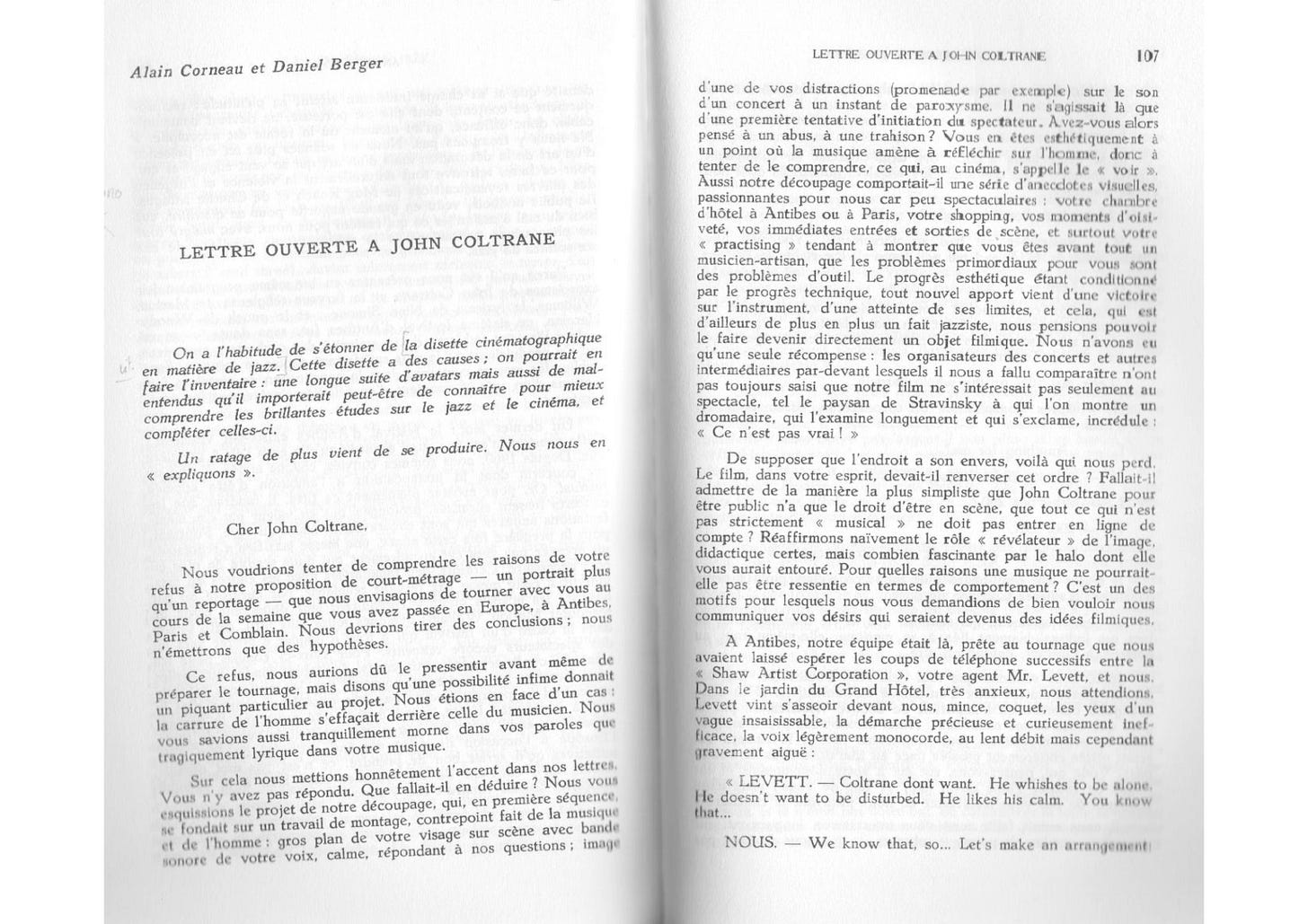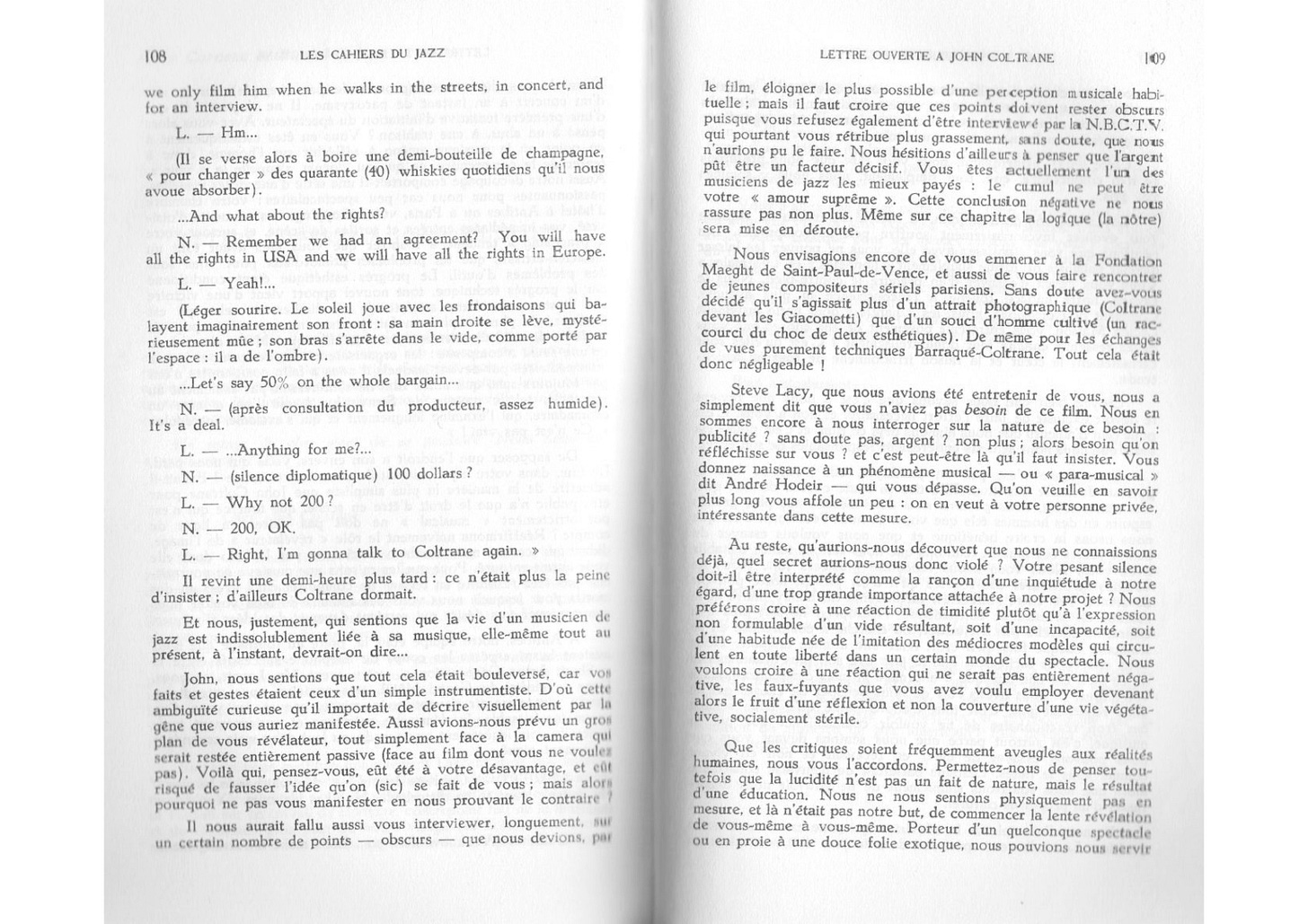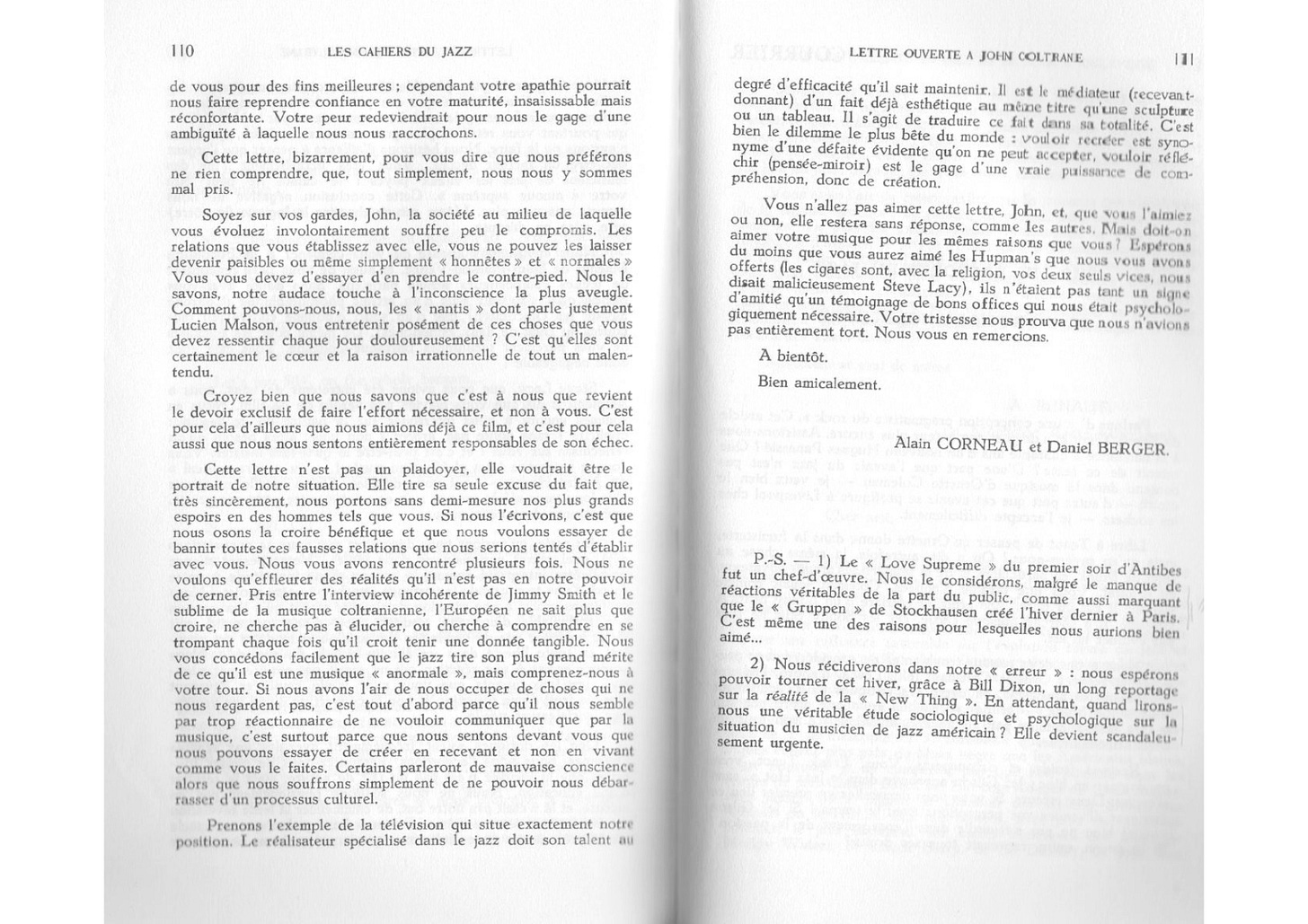The previous part is here. Let’s continue with the open letter that Alain Corneau and Daniel Berger published when Coltrane, through his manager and lawyer Harold Lovett, did not agree to making a documentary.
Please remember, this is a detailed summary, not a translation:
In the previous post, I summarized for you these two pages:
And these two pages through the second paragraph of the second page, 109. So let’s begin with the third paragraph on page 109.
[Soprano saxophonist] Steve Lacy [he spent most of his time in Europe starting in 1965], whom we had talked to about you, simply told us that you didn't need this film. [In other words, unless Coltrane really wanted to do it, he had no reason to agree to it.] We are still wondering what kind of need would make one do a film. Advertising? Money? No, neither. [Composer and jazz historian] André Hodeir says you are giving birth to a musical or “para-musical” phenomenon which is beyond you. It seems that the fact that we want to know more maddens [angers] you a little.
[Next paragraph.] But what would we have discovered that we didn't already know, what secret would we have violated? Should your heavy silence be interpreted as a concern about us? We prefer to believe that you’re timid [shy]. We want to believe in a reaction that would not be entirely negative [that it’s not because you have nothing to say].
[Last paragraph on this page.] That critics are frequently blind to human realities, we grant you. Allow us to think again that lucidity [clarity] is not a fact of nature, but the result of an education. We didn't feel able, and it wasn't our goal, to begin the slow revealing of yourself to yourself. [Continue at the top of this next page:]
[Top of p.110] However your apathy could make us regain confidence in your maturity, elusive but comforting. Your fear would again become for us the pledge of an ambiguity to which we cling.
[Short paragraph.] This letter, strangely, is to tell you that we prefer not to understand anything, that, quite simply, we did it wrong.
[Next par.] Be on your guard, John, the society in which you involuntarily evolve suffers little from compromise. The relationship you establish with society, you cannot let become peaceful or even just "honest" and "normal.” You must try to reverse it. We know it, our audacity touches the blindest unconsciousness. How can we, the “haves” [as opposed to “have nots”] of whom Lucien Malson [philosopher and jazz scholar, current editor of this journal] speaks, calmly talk to you about these things that you must feel painfully every day? It is because they are certainly at the heart of this whole misunderstanding.
[Next par.] Please believe that we know that it is up to us to make the necessary effort, and not to you. That's why we already loved [the idea of] this film, and that's also why we feel entirely responsible for its failure.
[Long paragraph.] This letter is not a plea, but a portrait of our situation. We have met you several times. We only want to touch on realities that we are not able to define. Caught between the incoherent interview of [organist] Jimmy Smith and the sublime nature of the Coltranian music, the European no longer knows what to believe, does not seek to elucidate. [Smith was known to sometimes be extremely rude to interviewers.] We easily concede that jazz derives its greatest merit from the fact that it is “abnormal” [that is, unusual] music, but understand us in turn: It seems too reactionary to us to want to communicate only through music— it's mainly because we feel that we can try to create by receiving, and not by living as you do.
[Bottom of 100 and top of last page.] Let us take the example of television, which accurately locates our position [is an accurate comparison with what we do]. The director specializing in jazz owes his talent to a degree of efficiency that he knows how to maintain. It is the mediator (receiving-giving) of an already aesthetic fact in the same way as a sculpture or a painting. It is a question of translating this fact in its totality. It is indeed the most stupid dilemma in the world: wanting to recreate is self-defeating, but wanting to reflect (thought-mirror) is the guarantee of a real power of comprehension, therefore of creation.
You're not going to like this letter, John, and whether you like it or not, [we know that] it will go unanswered, like the others. But should we love your music for the same reasons as you love it? We hope at least that you liked the H. Upmann’s [Cuban cigars] that we offered you (cigars are, with religion, your only two vices, Steve Lacy told us mischievously). They were not so much a sign of friendship as a testimony of good offices, which was psychologically necessary for us. Your sadness proved to us that we were not entirely wrong. We thank you.
See you soon.
Sincerely,
Alain CORNEAU and Daniel BERGER.
P.S. 1) The “Love Supreme” from the first evening of Antibes was a masterpiece. We consider it, despite the lack of real reactions from the public, to be as remarkable as Stockhausen's “Gruppen” created last winter in Paris. This is even one of the reasons why we would have liked... [Well, you know they mean the film.]
[Regarding “reactions,” they’re referring to the fact that many French fans did not like “A Love Supreme” in concert, hadn’t yet heard the LP, and requested that he play more familiar pieces for the second night—which he did.]
2) We will repeat our “mistake” [by making films with other musicians]: We hope to be able to shoot this winter, thanks to [trumpeter and composer] Bill Dixon, a long report on the reality of the “New Thing” [aka the “avant-garde”]. In the meantime, when will we read a real sociological and psychological study on the situation of the American jazz musician? It becomes scandalously urgent.
[END]
So, why didn’t Coltrane and Lovett agree with the filmmakers? I can think of many reasons. First of all, Coltrane was indeed a quiet, somewhat private person, and he already knew that all three concerts were going to be filmed for television. (They were not all broadcast “live,” but would be shown soon.) In addition, the French concerts were recorded for radio. He probably felt that was all the “documentation” that he needed and wanted.
Much of their filming would have had to be done on his days off, precisely when he probably wanted a break. He surely did indeed think that their proposal was an “abuse and a betrayal,” as they guessed in the first part of this letter.
In general, when one requests permission in many aspects of life, it’s good policy not to give too much detail. It’s better to just give the minimum, and wait to see if more information is requested. I believe that by presenting their idea with too many specifics, they alienated Coltrane. What if they had initially said “We’d like to take some of the footage of your performance and add some interview footage and some shots of you offstage”? It’s possible that he might have agreed. But if their letters to him (which we don’t have) were even remotely as long-winded and philosophical as this one, it’s understandable that he was turned off to the project. Coltrane was not a self-important person (as I have explained in some detail) and would not have wanted to be presented as the creator of a “para-musical phenomenon”!
So, what about the filmmakers and their future projects? Berger and Corneau worked on a 13-minute documentary in 1969 called Le jazz est-il dans Harlem? (Is there jazz in Harlem?), which is listed on Imdb. But perhaps it was never completed. I don’t know anyone who has seen it, and Corneau once said he had tried unsuccessfully to make a documentary in New York. I also have never heard of their film about Bill Dixon and the “New Thing.”
So it appears that the Coltrane film was not the only one that never happened for these two filmmakers. However, Berger did film many artists for a French series about jazz in NYC during the summer of 1973. He captured moments onstage and off with Mingus, Noah Howard, Sam Rivers, Lonnie Liston Smith, and many others! One of his camerapersons was Tom Reichman, who had made the Mingus documentary in 1968.
More essays to come, as always!
All the best,
Lewis






This open letter is written from Paris in 1965 (pre-student revolt), at a time when Les Cahiers du cinéma was the intellectual and cultural reference (thanks to Sartre as a maître à penser) and it is published in a “sister” publication about jazz as cerebral as Les Cahiers. We are right in the middle of The Nouvelle Vague.
Today this letter reads as pretentious, condescending and arrogant. But the authors were young. Alain Corneau must have been 22.
They knew it was hopeless but they wanted to frame their afterthoughts in a direct letter to Coltrane to prove him that they are smart enough in case he didn’t get it (or his manager) when they first approach them about the documentary.
It’s almost that they can’t fathom that the genius of Coltrane fails to meet them anywhere. Imagine that!
Man, these guys would've been a DELIGHT on social media, I imagine...